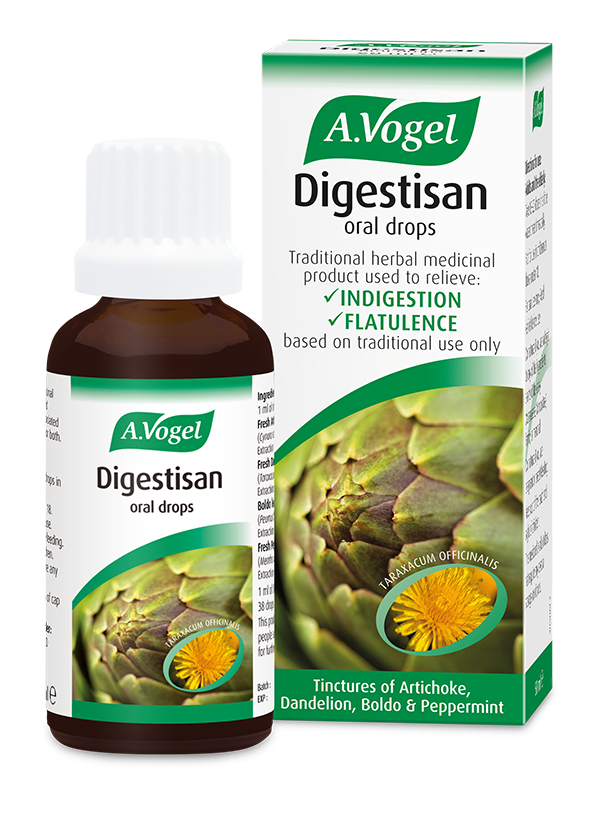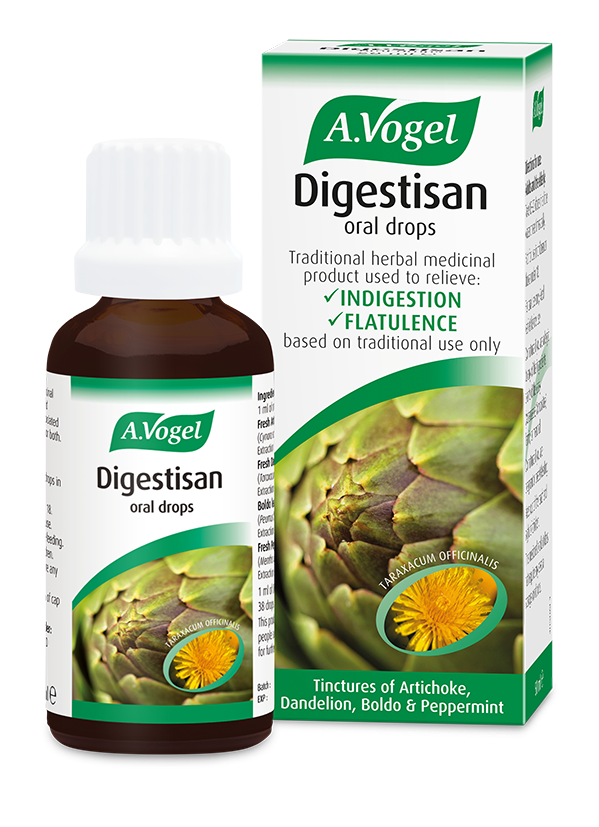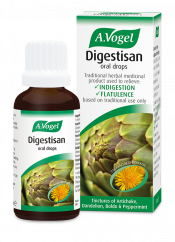What causes bloating?
Causes of bloating tend to be very individual, but can be a combination of lifestyle factors such as stress levels, and dietary factors that include not just troublesome foods, but also careless eating habits. The way you eat your food is just as important as the food you're eating. If you rush through a meal and don't chew your food properly almost anything can turn gassy on you and contribute towards unpleasant digestive symptoms.
You may find that there isn't consistency in the foods that cause you problems; for example, when you're on holiday you may find that you can eat dairy without any problems, but when you're back home and eat dairy the problems return. Here you're seeing a digestive response weakened by lifestyle factors such as stress, so that foods requiring more digestive power than others will cause trouble. When you're sunning yourself on holiday, you're less likely to be stressed. The body's response to stress, whether physical or emotional, includes the release of adrenalin. One of adrenalin's first actions is to shut down the digestive system, leading to a weak digestive response. Hence, trickier foods will start to bother you.
What are the surprising culprits?
There are some foods that are generally harder to digest, requiring more digestive energy; and these are, therefore, more likely to cause problems. When you eat these foods, they are likely to pass through the stomach and small intestine without being properly broken down. Bacteria begin to ferment the incompletely digested food, creating gas which bloats the abdomen.
Let's look further at some of these foods, including:
- Legumes
- Cruciferous vegetables
- Alliums
- Fruit
1. Legumes
This category includes peas, beans and lentils, which are infamous for causing gas!
Legumes are FODMAPs, a group of carbohydrates that are notoriously difficult for the body to digest, and they typically cause problems for people with sensitive digestive systems, such as people with IBS. Studies have shown that low FODMAP diets are beneficial in reducing bloating(1), making them more gut-friendly if you are prone to this problem. If you want to find out about more about low FODMAP diets have a look at my article "FODMAP-friendly foods".
Another reason for digestive problems can be to do with the difficulties in cooking legumes properly. They need careful soaking and rinsing and the right length of cooking time at the right temperature. Using salt-free tins of precooked legumes is one way to lessen the likelihood of a reaction.
If your bloating is triggered by legumes then sometimes persevering is the answer. Start with small portions of legumes and slowly build up your portion size. This slowly strengthens your digestive system, helping it to get used to handling these hard-to-digest foods.
What can I eat instead?
If you find that legumes contribute towards your bloating problems why not try tofu instead? It's vegan and can be easily added into recipes to make a tasty meal. For more information about cooking with tofu have a look at our page "How to cook with tofu".
2. Cruciferous vegetables
Cruciferous vegetables are from the Brassicaceae family (also known as Cruciferae) and include broccoli, cabbage and Brussel sprouts. This group of vegetables have loads of health benefits, but they are also notorious for causing gas and bloating!
These vegetables contain oligosaccharides, as well as raffinose, a complex carbohydrate that the body struggles to digest because humans lack the enzyme required to break it down. This results in bacteria in the large intestine fermenting the raffinose, potentially leading to bloating and gas.
Cruciferous vegetables also contain sulphur – the natural compound that causes digestive gas to smell. Digestive gas can be experienced in the form of burps or flatulence. Eating foods that contain sulphur can lead to excessive gas that has an unpleasant smell. These compounds, combined with the oligosaccharides, make cruciferous vegetables a little tough on an underpowered digestive system, especially if you are consuming these veggies in high quantities!
What can I eat instead?
Swap cruciferous vegetables for other green vegetables such as spinach and courgette.
3. Alliums
The Allium family includes onions, garlic and leeks. These contain fructans - oligosaccharides that are made up of fructose and glucose molecules. Unfortunately, fructans are tricky to metabolise in the small intestine since we have a limited ability to digest these. (2) This results in the incompletely-digested fructans reaching the small intestine where again gut bacteria start to ferment the fructans, ultimately leading to digestive problems such as bloating.
Similar to cruciferous vegetables, onions and garlic also contain sulphur. Since sulphur compounds produce the odour in gas, eating foods that are rich in sulphur may lead to unpleasant smelling wind. This is more likely to happen if you have slightly weaker liver response than is ideal, as the liver is important in metabolising allium constituents.
What can I eat instead?
Herbs such as ginger and fennel are both FODMAP-free and add a tasty flavour to your recipes.
4. Apples and other fruit
Fruits such as apples, prunes and peaches contain sorbitol, a sugar that can cause digestive problems. Undigested sorbitol is broken down by bacteria in the large intestine where they begin to ferment and create gas, ultimately leading to bloating.
Apples also contain insoluble fibre. This type of fibre does not dissolve in water, adds bulk to your stool and can help constipation. Whilst fibre can help improve digestive problems, eating too much fibre all at once can leave you feeling bloated and gassy. (3)
Most fruits can be eaten raw, but unfortunately, this can cause problems for your digestive system if it's not very strong. Warm/cooked foods are easier to digest since some of the fibre is broken down as it is cooked. Lightly stewing your fruit may make it easier for your gut to process.
What can I eat instead?
If you find that apples make you bloated and gassy why not try a handful of blueberries or raspberries as a healthy snack instead? These are low in FODMAPS and are packed with nutrients! Try stewing fruit like pears with some spices for a delicious treat. And, once they're cooked, make sure to eat them before they cool down as colder food is harder to digest than warm food!
Self help for bloating
- Bloating is a common digestive complaint, and there are loads of things you can do about it. Below I have listed some handy tips to help beat the bloat!
- As I have said in many previous blogs, chew your food! It's one of the simplest steps you can take to improve your digestion – and it's free! If you chew your food properly it's easier for your digestive system to access the nutrients coming from your food.
- Whilst it is recommended to drink 1.5 litres of still, plain water daily, avoid drinking any fluids at least half an hour before eating a meal. Drinking whilst eating increases the volume of food/drink in the stomach, making it more likely you'll get reflux. Also, if you drink whilst eating you may be less likely to chew your food, leading to poor nutrient absorption.
- Try to relax whilst eating. If you regularly eat on the run, you'll be way more likely to suffer from digestive issues. Sit down, relax, and let your body focus on digestion.
- Eat more warm and cooked food than cold/raw foods. As I mentioned earlier, eating raw foods such as vegetables can be tough on your digestive system, since they contain insoluble fibre. The process of cooking helps to break down fibre, making it easier for the body to digest and absorb nutrients.
- Separate fruit from high protein foods. When we consume fruit, we only need light enzymes to digest these; however, when we consume foods that contain protein, we require much stronger enzymes, which have an unfortunate effect on fruit.
- A common error is the workplace lunch – do you eat a sandwich for lunch then finish it off with a piece of fruit and wash it down with a fizzy drink thinking that you're being "kind of healthy"? Unfortunately, this is not the case! Firstly, bread is a well-known gluten-containing product that can cause bloating. Secondly, by the time you've eaten your sandwich, your stomach will have produced plenty of stomach acid, and adding fruit to this will cause the fruit to ferment in the acid. You'll then find your stomach bubbling and boiling all afternoon.
So, what can you take away from this blog?
- Digestive power plays a huge role in bloating. A weak digestive system along with a combination of lifestyle factors, diet choices and careless eating can contribute towards bloating.
- Minimise the risk of bloating by improving how you eat, and reducing your intake of foods that are hard to digest. Making small changes to your diet and lifestyle can quickly make a difference to your digestion, which is encouraging.
Originally written on 22nd March 2016, updated on 21st January 2020.
What you said
We recently ran a poll to find out which foods contribute towards your bloating problems. We've crunched the numbers and here are the results.
Results: Which of these foods contribute towards your bloating problems?
The majority of you agreed that you think legumes and cruciferous vegetables contribute towards your bloating problems. Remember there are a few tasty alternatives to these foods that you can eat instead, such as tofu, spinach and courgette.










